

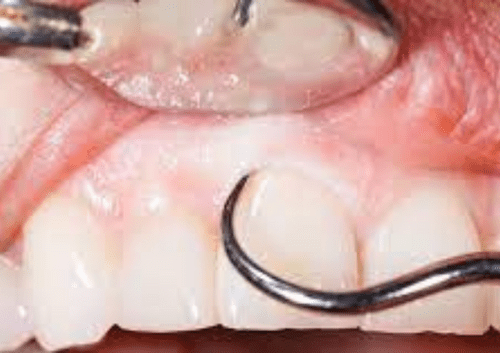
A scaling and root planing, sometimes referred to as an SRP, SCRP, or deep cleaning, is a specific kind of dental cleaning designed for people with active periodontal disease. Unfortunately, unlike the preventative dental cleanings that you typically schedule every six months, your dental insurance will not pay for all of the costs associated with a deep cleaning. Some individuals may decide against scheduling an SRP cleaning altogether due to the associated cost of doing so.
Don't let the price of a deep cleaning dissuade you from getting it done, though, because the longer you wait to treat your gum infection, the more harm you'll inflict to your mouth. How much does it cost to complete a thorough cleaning? It is dependent upon the number of teeth damaged as well as the nature of your dental insurance coverage. You can also save a significant amount of money by being prepared, and you can save up to sixty percent on thorough cleanings by enrolling in a dental savings plan.
Should I Get a Thorough Cleaning?
The most straightforward way to explain why you might require a deep cleaning is to first examine the things that are skipped over during a standard cleaning. The objective of a routine preventative cleaning is to serve as maintenance so that your mouth can remain in good health. It does not go very deeply beneath the gums into the deep "pockets" that are home to active illness and significant tartar buildup.
If you were to gloss over those regions, it would be the equivalent of your dentist and hygienist engaging in "controlled neglect." If you do have signs of disease in your mouth, your dentist and hygienist will advise you that you require a scaling and root planing procedure (SRP) or a "deep cleaning" in order to return your smile to a state in which it is free of disease.
If you have any of the following symptoms, you should have a deep cleaning as soon as possible:
SRP Fees are Affected by a Number of Cost Factors
The price of a dental deep cleaning, on the other hand, might vary widely depending on a number of various aspects of the patient's situation. It is possible that the price of an SRP will go up or down depending on which of these factors are applicable to your specific circumstances. The following are some of the most often seen variables:
1) How many of your mouth's four quadrants are currently getting cleaned?
During a deep cleaning, your mouth will often be sectioned off into fourths, with each quadrant receiving its own cleaning in turn. The majority of patients who have periodontal disease require cleaning in all four quadrants of their mouth.
2) The total number of teeth present in each of the four quadrants
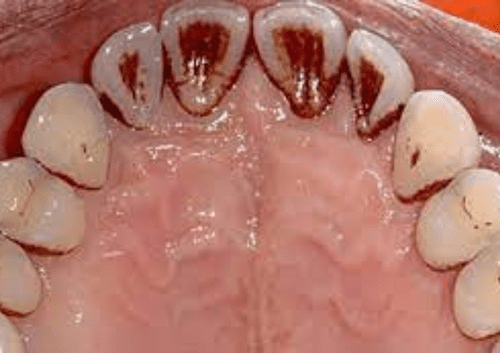
A person who is missing their wisdom teeth will have seven teeth in each quadrant of their mouth. On the other hand, perhaps you have already lost teeth or merely have a few teeth that are affected by active periodontal disease. The price of a thorough cleaning might be changed based on the number of teeth that are involved in each quadrant. In most cases, the answer will either be "four or more" or "fewer than four."
3) What is the grand total of the number of visits?
The entire out-of-pocket costs that are incurred will be affected by the total number of appointments that are scheduled. Particularly in the event that sedation or further anesthetics are required.
4) If you want to be sedated throughout the visit, you can ask for laughing gas.
When getting their teeth cleaned, some people want to take a mild sedative for comfort. In most cases, the individual patient's wishes are taken into consideration on whether or not this step is performed at all. However, there is an additional expense associated with sedation, particularly if more profound categories of drugs are utilized to achieve the desired effect. Nitrous oxide is typically the most cost-effective alternative, and the additional cost at each consultation may range anywhere from $20 to $40.
5) Determine whether or not a debridement is required before the procedure.
To demonstrate that you are in need of a scaling and root planing procedure (SRP), your insurance company will require a periodontal chart that is exhaustively detailed, as well as a full mouth series of X-rays. Only then will a deep cleaning be performed. A "debridement" may be necessary, however, if there is so much plaque on your teeth that your dentist is unable to view your gums in order to take measurements of them. This is not a cleaning in the traditional sense; rather, it is only a rapid removal of thick tartar deposits so that an appropriate assessment may be performed to determine the most effective method of treatment for you.
6) Your post-periodontal maintenance
In a purely scientific sense, periodontal disease does not cure itself, and you will continue to experience some gum and bone loss throughout your life. Periodontal maintenance visits, as opposed to preventative cleanings, are likely to be the type of cleanings that your dentist will perform at your regular checkups (prophylaxis.) This tiny change must be categorized differently on your dental insurance claims, which will also effect your long-term out-of-pocket payments.
How Much Does SRP Cost If You Don't Have Insurance?
Without insurance, how much does it cost to get a deep cleaning done?
If you still have all of your teeth, it will cost you approximately $300 each quadrant, but the exact amount will vary depending on where in the country you live. This pricing can change by approximately $100 to $150 each quadrant at any given time. If you don't have dental insurance, you should plan on spending an average of between $800 and $1,800 for your full mouth restoration (if you have all of your teeth.)
The price of quadrants with less than four teeth in each position is reduced. If this is the case, you should expect to pay approximately $100 less on average for each quadrant. Therefore, around two hundred dollars for each quadrant or between 600 and 1200 dollars for the entire mouth if there are less than four teeth in each quadrant.
What is the going rate for a thorough cleaning that includes insurance?
How much does a more in-depth cleaning cost if you have dental insurance and want to get it done?
When compared to the expense of regular preventative cleanings, which are typically covered in full by dental insurance, the cost of a deep cleaning is typically reimbursed only partially. Since insurance is typically focused on prevention, it pays more for services that are preventative in nature. If you have gum disease, you are no longer avoiding dental infections; rather, you are treating them after they have already occurred.
There is not a single dental insurance plan that is the same. Before purchasing coverage under a plan, the particulars are typically hammered out either by your company or by you personally. Deep cleanings are often covered by the typical dental insurance policy at a rate of approximately fifty percent. That's a significant drop from the typical one hundred percent that most people expect for regular dental cleanings.
If you are not used to paying $400 or $900 to have all of your teeth cleaned, then this scenario may cause you to experience sticker shock. This is especially true if you haven't had all of your teeth cleaned in a while. It is important to keep in mind that this is not a preventative or maintenance cleaning; rather, it is a therapy that consists of soft tissue therapies.
It is quite risky to put off going to the dentist for your routine exams because doing so might result in serious consequences, including gum disease. However, if you pay for an SRP with insurance, you will continue to save money throughout the course of your smile's lifetime while also protecting your teeth. Do not put it off any longer.
With a dental savings plan, you can save up to sixty percent on dental deep cleanings.
What are the Dangers Associated with Refusing to Obtain an SRP?
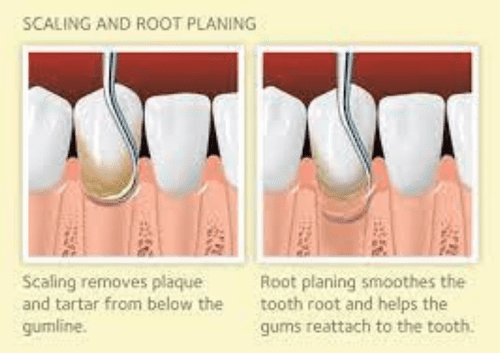
The cost of SRP cleaning is, without a doubt, the factor that contributes most frequently to individuals' decisions not to carry out their planned thorough cleaning. They might ask their insurance provider to fund "just a basic cleaning" or they could try to find an office that accepts their plan by calling around to different places.
When you have active gum disease, if you don't get a deep cleaning, the bacteria that live under your gums will continue to spread and cause further problems. Your teeth will become loose and finally fall out as the tissues and bone surrounding the roots of your teeth detach and degrade over time. This will cause your teeth to become mobile. It is not a matter of "if" but rather "when" it will happen. If you put off getting a thorough cleaning, there is a bigger chance that you will never be able to get the gum infection under control. This risk increases proportionately with the amount of time that passes.
Your tongue is not the only thing that could get hurt. Numerous scientific studies have shown that the more severe a person's gum disease is, the more difficult it is to cure or control a variety of medical disorders, including but not limited to:
The good news is that after the infection in your mouth has been eradicated, your immune system will be strengthened, and your body will be better able to recover from the underlying medical ailments it was suffering from.
How can I obtain an SRP at the lowest possible cost?
Whether or not you have insurance, the following are two wonderful choices to think about if you are unable to pay the expense of a deep cleaning:
Dental Savings Plans
Dental discount plans are an excellent option for families as well as individuals who are looking to save anywhere from ten percent to sixty percent off the typical cost of dental care. Give us a call at (702)341-9160 and ask about our Dental Savers plan today!
Payment Plans
With an in-house or third-party dental payment plan, you won't have any trouble paying for your comprehensive cleaning. Summerlin Dental Solutions has formed a partnership with CareCredit, which enables patients to obtain financing with zero or low interest for a period of six months to twelve months or more. In most cases, you will be able to pay off your deep cleaning by making manageable monthly payments and will be able to do so well before any interest costs become applicable.
What You Can Anticipate From SRP's
Aside from "bracing" yourself for the larger cost of the deep cleaning, an SRP is comparable to a particularly thorough dental cleaning. The most significant distinction is that the dental hygienist will typically just focus on one quadrant or one half of your mouth at a time, rather than the entirety of your mouth all at once.
This procedure allows for more time, which allows for more thorough cleaning to be done with specialized tools on regions that are difficult to access. It also makes it feasible to numb that area of your mouth with local anesthetic, so that you don't really have to feel anything other than some pressure. This eliminates the need for you to worry about experiencing any pain.
It's not something everyone desires, but having numbness in their tongue is always a possibility. When it comes to desensitizing their teeth and gums, some people choose using a numbing gel or rinse that works more temporarily. Because local anesthetics are administered, your dental hygienist will be able to clean one side of your mouth while the other side of your mouth remains numb.
Your in-depth cleaning will almost definitely be split up into at least two appointments, with one visit focusing on the cleaning of one side of your mouth and the other visit focusing on the cleaning of the other half.
Do the SRP Cleanings Cause Any Pain?

The majority of persons who suffer from gum disease have teeth and gum tissues that are sensitive. Because of this, in most cases, a local anesthetic will be used during the deep cleaning procedure. However, the sensitivity of your teeth shouldn't be to the point that you need to be "knocked out" for the appointment. Laughing gas, often known as nitrous oxide, is requested by some individuals so that they can feel more at ease.
After a deep cleaning, it is not uncommon to have some discomfort and sensitivity in the area that was cleaned. The calcified detritus that had been coating the root surfaces has been removed, which is the primary reason for this change. You will probably want to use a variety of sensitive items such as toothpaste or fluoride rinse to assist minimize your discomfort as the tissues begin to recover and tighten around your roots. These products can be used when the tissues begin to heal and tighten around your roots. It is also not uncommon for the places where the local anesthetic was injected to feel a bit sore after the procedure has been completed.
Your grin will live on in perpetuity. If the only thing standing between you and a healthy mouth is the cost of SRP cleaning, then you should definitely look into other financing methods or speak with Summerlin Dental Solutions staff in Summerlin, Nevada about your alternatives. Your whole body, not just your mouth, is vulnerable because maintaining a healthy oral environment is necessary to keep your immune system functioning properly. The relatively small sum spent on a thorough cleaning will more than pay for itself in the years and decades to come.
CLICK HERE TO SCHEDULE YOUR APPOINTMENT!
GET TO KNOW YOUR BEST DENTIST IN SUMMERLIN
Dr. Marianne Cohan was voted The Best Dentist/ Dental Office and Best Cosmetic Dentist from The Las Vegas Review-Journal in 2020 and 2021. She received her Doctor of Dental Surgery (DDS) from the State University of New York at Buffalo in 1992.

With an emphasis on cosmetic dentistry, complete makeovers, and implant dentistry, Dr. Cohan is committed to continuing education and feels that we never stop learning. Dr. Cohan takes pride in using high-powered magnification to perform minimally invasive restorative dentistry. She uses all the latest technological advances including digital radiography, digital photography, computer simulations, and high-resolution pictures of your proposed treatment on 55-inch screens. She also utilizes CBCT (cone beam) and laser technology.
Dr. Cohan is always available to her patients and is available for any dental emergency.
A comparison of dental veneers vs dental crowns, along with advice at your Summerlin Dental Office

PEOPLE ASK:
What are the most significant distinctions that exist between veneers and dental crowns?
What is the cost, technique, and benefits associated with both veneers and crowns.
Should I get veneers or crowns?
CLICK HERE TO SCHEDULE YOUR APPOINTMENT !
Crowns or veneers for your teeth? Oh, my! You've identified a problem with your teeth that has to be addressed, but how can you determine when to go in for which procedure? Consult with your dentist to determine the best course of action. However, if you are interested in learning more about each procedure for your personal purposes, continue reading to learn how to pick between veneers and crowns as well as a comparison of the two procedures at your Summerlin Dental Office.
To begin, you will need to have a complete comprehension of what each procedure includes. Dental veneers are similar to “wafers” in appearance and are bonded to the surface of the front teeth. Porcelain or composite are two examples of the materials that may be used to construct them. The most durable veneers are made of porcelain, but they are also the most costly.
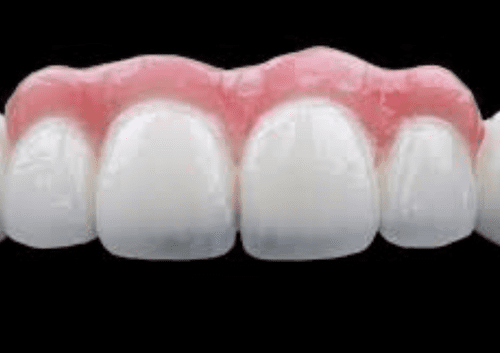
In order to prepare the front surface of your tooth for the veneer, your dentist will first grind away a little portion of the enamel. This helps the veneer adhere more securely to the tooth by roughening the surface of the enamel of the tooth. In addition to this, it creates room on the front of your tooth for the veneer, which will have a thickness of around 1 millimeter.
After that, at your best cosmetic dentist in Summerlin we will either digitally scan your teeth or develop an impression of them in order to have veneers produced. If your dentist has a machine in the office, then the procedure can be performed on the same day. Or, it will be shipped off to the laboratory, and you will need to return in 1-2 weeks when the veneers are ready to be glued into place.
In the field of cosmetic dentistry, veneers are the treatment of choice for addressing a variety of aesthetic concerns. For instance, teeth that are slightly misaligned or chipped. If your teeth have become significantly discolored and the conventional methods of tooth whitening are not producing the desired results, you may be able to restore your beautiful smile by having veneers placed over all of your front teeth. This will change the color of your teeth and give you back your radiant smile.
It is important to keep in mind that the application of veneers is not a reversible process because of the reduction that is required to create space for the thin layer of material. If one of your veneers is broken or has gotten discolored, the only method to repair it is to replace it with a new one.
You need to see your best cosmetic dentist near me!
CLICK HERE TO SCHEDULE YOUR APPOINTMENT !
And what exactly are crowns?
When comparing porcelain crowns with veneers, there is an important distinction that needs to be made. Dental crowns are regarded to be a restorative procedure whereas veneers are believed to be simply aesthetic dentistry procedures. They totally encapsulate the tooth, much like a small cap that goes over the top, rather than merely placing a thin coating on the front surface of the tooth.
In most cases, they are employed when the natural tooth structure has been compromised due to the presence of a significant cavity, infection, or fracture caused by a blow to the tooth. Crowns can be placed on any tooth, although they are most commonly seen on the back molars. Veneers, on the other hand, are only ever used on the front teeth.
Your natural tooth will need to be reduced in size and reshaped by the dentist before a crown can be placed on it. Additionally, the dentist will need to get the surface of the tooth ready for bonding. After the tooth structure has been prepared, your dentist will either take a digital scan of it or build a mold of it in order to create a crown that is a precise fit. To reiterate, this might take place in the comfort of one's own workplace or be sent out to a separate laboratory.
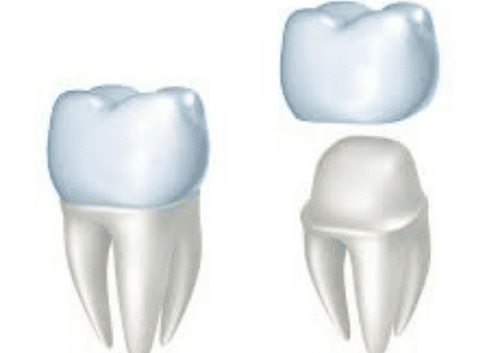
If you need to wait a few weeks for the permanent crown, your dentist will most likely place a temporary crown on your tooth in the meanwhile. While you wait for the permanent crown to be constructed, you will be able to eat and speak without any discomfort thanks to this solution.
CLICK HERE TO SCHEDULE YOUR APPOINTMENT !
Which one, veneers or crowns, is more long-lasting?
The longevity of any choice is contingent upon a number of variables, including the skill of your dentist and the degree to which you maintain good oral hygiene.
Another significant factor is the material that you decide to use. Whereas composite veneers may only last between 5 and 7 years, porcelain veneers have a lifespan of between 10 and 15 years.
CLICK HERE TO SCHEDULE YOUR APPOINTMENT !
Many different kinds of materials may be used to construct crowns. Since the beginning of dentistry, gold and alloys of gold have been utilized. This practice dates back thousands of years. Metal crowns are extremely durable and can continue to look beautiful for decades. The most obvious drawback is the fact that you are walking around with a piece of metal in your mouth. Molars are the teeth that often get these crowns put on them.
Dental veneers: Their types, pricing, procedures, and what you may expect from them
Crowns made of porcelain can be crafted to look just like a patient's actual teeth, but they are more brittle. These are often placed on the front teeth in order to improve their appearance.
Crowns made of porcelain that are bonded over a metal alloy combine the benefits of both materials, giving you the best of both worlds. Unfortunately, a thin strip of metal may frequently be seen around the gum line.
How well you care for your teeth will have a substantial impact on how long both of these dental procedures will continue to be effective. Always be sure to clean your teeth and floss on a daily basis, and steer clear of using your teeth as cutting implements, particularly if you have veneers placed on your front teeth. Additionally, do not forget to schedule an appointment with your dentist and to go see them at least twice year.
CLICK HERE TO SCHEDULE YOUR APPOINTMENT !

Which comes with a higher price tag: veneers or crowns?
The term "Hollywood smile" is commonly used to refer to veneered teeth. They are done for the express goal of improving a person's appearance and may be rather pricey, especially when numerous teeth need to be treated at the same time.
On the other hand, veneers are significantly thinner than crowns. Dental crowns cover the entire tooth, whereas veneers just cover the visible portion of the tooth in front of the gum line.
If you follow that line of reasoning, you would anticipate that the cost of veneers, in comparison to that of crowns, would be lower. In most cases, yes, they are. A porcelain veneer can cost anywhere from $925 to $2,500 per tooth, with the average price falling somewhere in the middle. Veneers produced from composite materials are available for far less money, ranging from $250 to $1,500 per square foot, but you shouldn't expect them to last as long.
The price of a porcelain crown can range anywhere from $1,000 to $3,500 for a single tooth. And that doesn't even take into account the price of the root canal or any of the other dental treatments that may need to be done before the crown can be placed.
Having said that, there is a significant distinction between the two that you should be aware of. The application of veneers is regarded as solely a cosmetic surgery. Therefore, dental insurance will, in most cases, not cover them.
However, crowns are typically utilized in situations where there is a dental issue with the tooth. They can be used to support and protect a tooth that has a significant cavity, or they can be used to keep together a tooth that has been fractured or damaged.
As a consequence of this, dental insurance will often pay for a portion of or the entire surgery.
CLICK HERE TO SCHEDULE YOUR APPOINTMENT !
What are the benefits and drawbacks of getting veneers versus crowns?
When there are no other dental issues present, veneers are an excellent choice for improving the appearance of one's teeth. It may only be necessary to perform a limited amount of reduction, depending on the kind of veneer, which will result in more of your natural tooth structure being preserved.
Unluckily, veneers will need to be changed when they begin to show signs of wear and tear. Because the procedure cannot be reversed, once you decide to go through with it, you will be required to take care of the results for the rest of your life. Because they do not cover the entirety of your tooth, they leave your natural tooth open to the risk of developing cavities. On the other hand, maintaining good oral hygiene can considerably reduce the risks associated with this.
Crowns made of porcelain are designed to mimic the look and feel of real teeth. In addition, the cap covers the whole of the tooth, so shielding it from the effects of dental decay. Crowns are generally covered by dental insurance when they are put for medical reasons because of their long-lasting nature.
Crowns made of metal are more durable than those made of porcelain, which looks more natural but is more brittle. The use of porcelain over metal can be a fantastic choice; nevertheless, you will need to live with a thin black line at the base of the porcelain. In order to prepare the location for a crown, you will need to have more of your natural tooth ground down. Crowned teeth are known to be more sensitive to extremes of temperature.
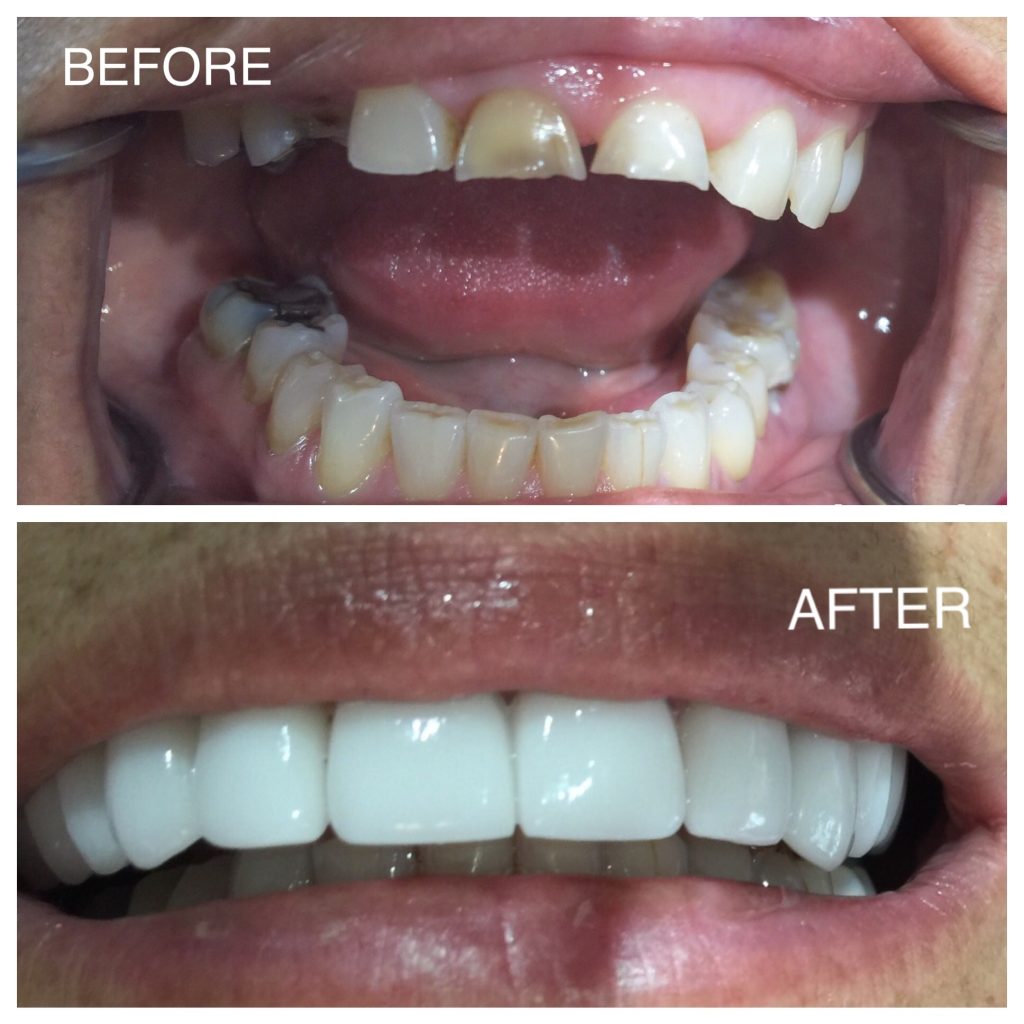
Concerning crowns and veneers, here are some questions to ask your Summerlin Dental dentist.
You should now have a clearer understanding of what both of these processes entail. Be careful to have a conversation with your Summerlin dentist about these concerns before making a decision about which treatment option is best for you.
CLICK HERE TO SCHEDULE YOUR APPOINTMENT !
How many more years should I anticipate my dental crown to last?
Your dentist will be able to provide you with a more accurate forecast of what to anticipate with the materials that they will select for the surgery.
After the procedure, do you have any recommendations for extra care to take?
Brushing and flossing your teeth at least once a day will always be required for optimum oral health. In addition to scheduling two appointments with your Summerlin Dental dentist in your area per year.
Are adjustments to the fit of the crowns included in the price?
Crowns have a tendency to shift slightly after placement, which might throw off your bite. You have the ability to modify them, but you should be aware of any additional costs involved.
What additional possibilities are there to choose from?
If you desire veneers but are concerned about the expense, you might want to consider getting Lumineers instead. This form of veneer is less thick and more affordable than others, but it does not usually conceal severe tooth damage or discoloration.
Dental bonding is a method that can be better suitable for fixing fractured teeth. During this procedure, your dentist will use a specific type of composite resin to rebuild the tooth and replace the area that was lost.
It is possible that extracting a tooth that is seriously damaged and having it replaced with a dental implant would be a better course of action than placing a crown over the tooth.
Are you prepared for an amazing smile?
Rejoice in the fact that contemporary dentistry provides us with so many wonderful alternatives, whichever treatment you decide to go with. Everyone has the potential to achieve the sparkling smile of their dreams if dental care is made more accessible and inexpensive.
CLICK HERE TO SCHEDULE YOUR APPOINTMENT !
GET TO KNOW YOUR BEST DENTIST IN SUMMERLIN
Dr. Marianne Cohan was voted The Best Dentist/ Dental Office and Best Cosmetic Dentist from The Las Vegas Review-Journal in 2020 and 2021. She received her Doctor of Dental Surgery (DDS) from the State University of New York at Buffalo in 1992.

With an emphasis on cosmetic dentistry, complete makeovers, and implant dentistry, Dr. Cohan is committed to continuing education and feels that we never stop learning. Dr. Cohan takes pride in using high-powered magnification to perform minimally invasive restorative dentistry. She uses all the latest technological advances including digital radiography, digital photography, computer simulations, and high-resolution pictures of your proposed treatment on 55-inch screens. She also utilizes CBCT (cone beam) and laser technology.
Dr. Cohan is always available to her patients and is available for any dental emergency.